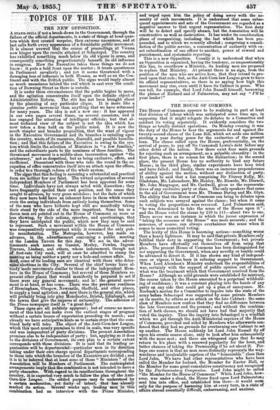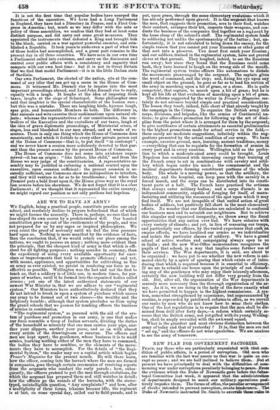THE HOUSE OF COMMONS.
THE House of Commons appears to be realizing in part at least that division of labour which was anticipated some time ago, in supposing that it might relegate its debates to a Committee and conduct its voting separately. It evidently considers the two things as totally distinct operations. On Monday evening it was the duty of the House to hear the arguments for and against the twenty-second clause of the Loan Bill, which set aside one million sterling a year during peace for the extinction of the present loan. The clause called upon the House, -preferentially, on the arrival of peace, to pay off Sir Cornewall Lewis's debt before'any other debts of the nation. Now there exist four main grounds for rejecting such an arrangement, as a palpable absurdity : in the first place, there is no reason for the distinction ; in the second place, the present House has no authority to bind any future House ; in the third place, similar experiments have been tried and have failed; and finally, there was an immense preponderance of ability against the motion, without any distinction of party. It cannot be said that a list comprising *Sir Fitzroy Kelly, Mr. Gladstone, Mr. Labouchere, Mr. Henley, Mr. Ricardo, Mr. Disraeli, Mr. John Macgregor, and Mr. Cardwell, gives us the representa- tives of any exclusive party or class. The only speakers that came to the aid of Government were Mr. Thomas Baring and Mr. Glyn. The ability that the House of Commons can bring to debates upon such subjects was arrayed against the clause ; but when it came to voting the proportions were reversed. Lord Palmerston said, "he was determined to take the sense of the House upon it"; and the House voted the clause by 210 to 111—about two to one. There never was an instance in which the jocose expression of "taking the nonsense of the House" was more accurate ; and the nonsense, of course, can always overbalance the sense when it comes to mere numerical voting. The levity of this House is becoming serious—something worse than a heavy lightness. It may be said that private Members only fulfilled their duty in supporting the Government ; but private Members have effectually cut themselves off from using that plea. The present House of Commons has been distinguished for not supporting the Government, when any novelty or bauble could be advanced to divert it. If it has shown any kind of independ- ence or vigour, it has been in refusing support to Government. When Lord Aberdeen's Ministry undertook the responsibilities of war, certainly with the support of public opinion out of doors, what was the treatment which that Government received from the House ? Although no solid grounds were established for mistrust, the course taken by the House amounted to a perpetual withhold- ing of confidence ; it was a constant playing into the hands of any party on any side that could get up a plan of annoyance. Mr. Roebuck's motion for a Committee to inquire into the state of the army before Sebastopol was supported by some private Members on its merits, by others as an attack on the late Cabinet : the same class of Members now confess that they find no difference between the late Government and the present ; and without the combina- tion of both classes, we should not have had that majority that voted the inquiry. Thus the inquiry into Sebastopol is a windfall which we get through the Anti-Ministerial caprices of the House of Commons, provoked and aided by Members who afterwards con- fessed that they had no grounds for overturning one Cabinet to set up another. The House suddenly let Lord John Russell fly off upon his erratic course alone, only to look after him subsequently with the more zest ; and there are whispered signs that he may return to his place with a renewed popularity for the hour, and better chances of taking the Premiership if he set about it. Per- haps one reason is that no man more distinctly represents the way- wardness and incalculable caprices of the " honourable " class than Lord John. We have had other representatives who have been called the Member for Ireland, the Member for Exeter Hall, or the Member for some great cumulative constituency not recognized by the Parliamentary Companion. Lord John might be called "the Member for the House of Commons." While Lord John, how- ever, was under a cloud, the House fixed upon Lord Palmerston; sent him into office, and established him there—it would seem only for the purpose of harassing him at every turn, in a state of affairs abroad essentially difficult, embarrassing, and anxious. It is not the first time that popular bodies have usurped the functions of the executive. We have had a Long Parliament in England, they have had a Directory in France, and a First Con- gress in America ; but, much as we may differ with the acts or policy of those assemblies, we confess that they had at least some distinct purpose, and clul carry out some great measures. They appointed the instruments that defeated a King and brought him to the block, carried on a war against powerful enemies, and elite- blished a Republic. It took years to undo even a part of what two of those bodies had accomplished, and a great part remains to the present day in all three countries. We have seen in our own time a Parliament called into existence, and carry on the discussion and oontrol over public affairs with a consistency and sagacity that compete with our own beat time: but it is not in Great Britain that we find that model Parliament—it is in the little Italian state of Sardinia.
Our own Parliament, the elected of the nation, sits at the com- mand of any idler that can get up a scene in the House of Com- mons. It witnessed Mr. Disraeli rise to inquire into the most important proceedings abroad, and Lord John Russell rise to reply, equally with a laugh. It laughs at the idea of imposing fresh taxes laughs at the siege of Sebastopol. Some philosopher once said that laughter is the special characteristic of the human race ; but this was a mistake. There are laughing birds, hyenas laugh, apes grin, and honourable Members do both. The difference is, that animals and wits exercise their eachinnations upon natural ob- jects; whereas the representatives of our constituencies, the con- trollers of the Executive and the custodiers of our taxes, laugh at the idea of grave diplomatic proceedings, of Ministerial crises, of sieges, loss and bloodshed to our men abroad, and at waste of re- sources. There is only one thing which the House of Commons does consistently, and which it forbids to every other private person out of the House of Commons—that is, to put itself "in contempt"; and we never knew a session more sedulously devoted to that pur- suit than the present session by the present House of Commons. The House of Commons does not come into existence unper- ceived—it has an origin : "like father, like child," and from the House we may judge of the constituencies. A representative as- sembly may be justified in enforcing a national control upon the executive, upon occasion sufficient : the present occasion is as- suredly sufficient, our Commons show no indisposition to interfere, and they will venture so far as to be troublesome ; but when the Premier puts a bold front upon it, the House gives way as the royal lion cowers before his showman. We do not forget that it is a class Parliament; if we thought that it represented the entire country, we might regard our position as not only perilous but hopeless.



































 Previous page
Previous page